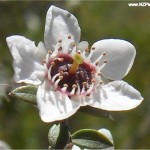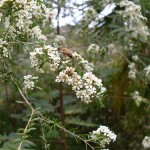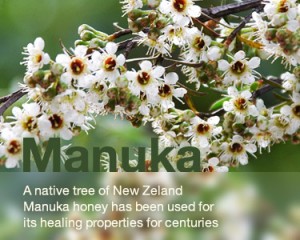
![manuka-honey[1]](http://wellnesswillpower.com/wellness/wp-content/uploads/2010/12/manuka-honey1-270x300.jpg)
The Manuka is found throughout New Zealand and often forms extensive areas of bush. The leaves are dotted with oil glands, and when bruised give off a gingery peppery smell. The flowers vary from brilliant white through to rose-pink.
The Maori people used Manuka as a medicinal plant, from treating fevers and colds to sedatives and early European settlers called it the “tea tree”. Apart from the medicinal properties contained by all honeys, Manuka honey contains a number of natural compounds with strong antibacterial properties. This is a strong flavoured honey but with a fresh clean bite.

- Manuka Honey Research
Honey is one of nature’s oldest folk remedies. Ancient civilizations used honey to help heal wounds.
There are many reports in medical literature of honey being successfully used for problems such as wounds, burns, skin ulcers, boils, infections.
Scientific university research is showing the reason why honey could assist natural healing and that UMF Manuka Honey has even greater healing qualities because of its enhanced antibacterial potency.
Read about the research and the amazing healing results with UMF Manuka Honey…
Raw Honey is honey which has antibacterial activity due to hydrogen peroxide.
Manuka Honey is that which has activity due to high levels of UMF. Plus hydrogen peroxide.
The name UMF( UNIQUE MANUKA FACTOR) indicates the honey has a high antibacterial component and indicates the antibacterial strength of the honey.
University Research confirms Honey as a Healer
Dr Peter Molan MBE, Associate Professor in Biochemistry at The University of Waikato New Zealand, has researched the healing properties of honey since 1981. He has found that honey heals primarily because of a natural hydrogen peroxide antibacterial property present in varying levels in most honeys.
More…
A Second Natural Antibacterial Agent
Dr Molan and his research team found in some strains of manuka honey a second more powerful antibacterial property called UMF. In laboratory tests the UMF property has been found to be effective against a wide range of bacteria including helicobacter pylori, staphylococcus aureus, e. coli…
More…
What is Special about UMF rated Manuka Honey?
UMF is a highly beneficial antibacterial property naturally present some strains of manuka honey.
Studies are showing manuka honey with a high levels of UMF(UMF10 or higher) helps the natural healing processes and is the preferred honey when selecting honey for its healing qualities.
More…
Antibacterial Activity of Different Honeys
Source: Manuka Honey As a Medicine by PC Molan, 2001. Honey Research Unit Website
A brief report of laboratory studies comparing, in vitro, the antibacterial activity of honeys against particular bacteria.
More…
Not All Manuka Honey has UMF Activity
The special UMF antibacterial property is not found in all manuka honey. UMF is a phytochemical (floral derived) property present in the nectar of only some manuka flowers. Special laboratory testing shows which manuka honey has the UMF property.
More…
Selecting Honey for Special Therapeutic Use
Care must be taken to:
1. Select honey which has assured antibacterial activity. The name UMF guarantees the honey has high antibacterial activity.
2. When selecting honey for wound care ensure it is thoroughly filtered and sterilized
3. Find out here what to look for when selecting honey for special therapeutic use.
More…
Digestive Care, Stomach Ulcers, Dyspepsia
In laboratory tests UMF Manuka Honey has been shown to inhibit, in vitro, the growth of helicobacter pylori, the bacteria which causes most stomach ulcers. The peroxide antibacterial activity of other honeys (including ordinary manuka honey) is not effective against this bacteria.
More…
Honey for Wound Care
Varicose and Skin Ulcers, Diabetic Ulcers, Wounds, Burns, Boils, Pressure Sores, Cracked Skin, Acne, Atopic Eczema
Studies and clinical trials are showing that high activity UMF Manuka Honey provides an optimum germ-free moist wound-healing environment which supports and facilitates the natural healing of varicose and skin ulcers, diabetic ulcers, pressure sores, wounds, burns, boils, cracked skin, cuts and grazes.
More…
Clinical Trial and Case Studies
A very successful clinical trial was carried out (1999 – 2000) at Waikato Hospital, Hamilton, New Zealand, using UMF rated Manuka Honey on unresponsive skin ulcers and chronic wounds.
Case Studies include the remarkable results when using UMF Manuka Honey on infected wounds, skin ulcers, abscesses, MRSA.
More…
Honey effective against MRSA
In the laboratory the antibacterial properties of UMF Manuka Honey have been found to be effective against MRSA (staphylococcus aureus) strains of bacteria which are notoriously resistant to antibiotics and sometimes responsible for closing hospital wards.
More…
Sore Throats, General Health, Energy Replacement
1. Antioxidants and Systemic Uses
Research in its early stages has found New Zealand honeys have useful levels of antioxidants with UMF Manuka Honey having the highest of all.
Many people have found having SummerGlow UMF16 Manuka Honey to be helpful in warding off and fighting the effects of a cold.
2. Streptococcus Pyogenes
Laboratory studies are showing the UMFantibacterial property is effective against streptococcus pyogenes (causes sore throats)
3. Energy Replacement
Studies are showing honey is an effective energy booster and replacement
The treatment of Gastroenteritis
When used to treat diarrhoea, honey promotes the rehydration of the body and causes the earlier clearing of diarrhoea, vomiting and stomach upsets.
More…
Honey for Eye Infections.
Research is looking into the effectiveness of honey for eye infections. The results look promising. There is a trial under way using honey to treat blephatis.
Honey for Dental Health
Recent research is indicating that UMF® rated Manuka Honey could be effective for oral hygiene as it inhibits acid production and helps prevent the development of cavities in teeth.
Trials are currently under way using honey to decrease dental plaque and gingivitis, and to prevent the development of dry socket after removal of impacted third molar teeth.
Honey for Animal Health
1. Wounds
2. Mastitis in Dairy Cows and Goats
3. Scours in Calves
More…
Manuka honey as a medicine
P. C. Molan, Honey Research Unit
Honey – an ancient remedy “rediscovered” The usage of honey as a medicine is referred to in the most ancient written records, it being prescribed by the physicians of many ancient races of people for a wide variety of ailments (Ransome 1937).
More…
Using honey to treat wounds infected with MRSA
Text of a paper presented at the First World Wound Healing Congress, 10-13 September 2000, Melbourne, Australia.: The potential for using honey to treat wounds infected with MRSA and VRE. (Allen, K. L.; Hutchinson, G.; Molan, P.C.)
PDF File: The potential for using honey to treat wounds infected with MRSA and VRE
More information at: www.honey.bio.waikato.ac.nz/potential.shtml
Acknowledgement
We are very grateful to Dr Peter Molan of the Honey Research Unit at Waikato University, New Zealand, for his dedicated research and knowledge.
Many people worldwide have benefited greatly from the findings of his years of passionate study into the healing qualities of honey – many of these people had previously had conditions for which no other treatment had been effective.

